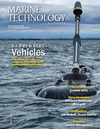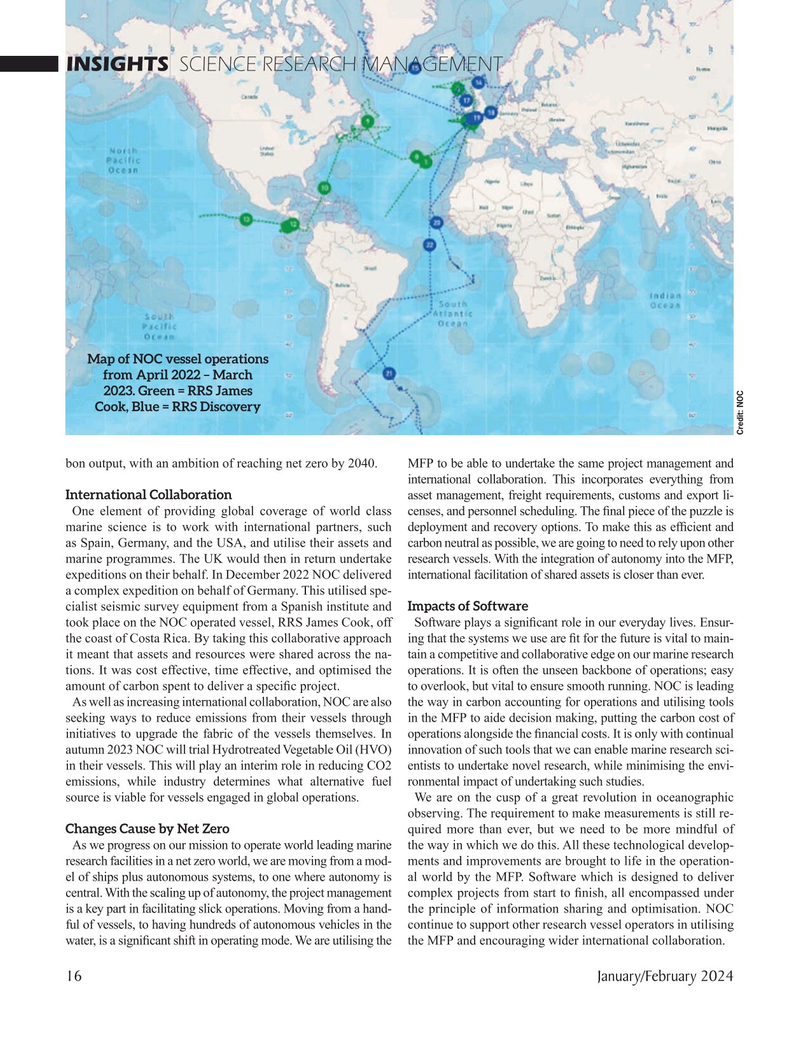
Page 16: of Marine Technology Magazine (January 2024)
Read this page in Pdf, Flash or Html5 edition of January 2024 Marine Technology Magazine
INSIGHTS SCIENCE RESEARCH MANAGEMENT
Map of NOC vessel operations from April 2022 – March 2023. Green = RRS James
Cook, Blue = RRS Discovery
Credit: NOC bon output, with an ambition of reaching net zero by 2040. MFP to be able to undertake the same project management and international collaboration. This incorporates everything from
International Collaboration asset management, freight requirements, customs and export li-
One element of providing global coverage of world class censes, and personnel scheduling. The ? nal piece of the puzzle is marine science is to work with international partners, such deployment and recovery options. To make this as ef? cient and as Spain, Germany, and the USA, and utilise their assets and carbon neutral as possible, we are going to need to rely upon other marine programmes. The UK would then in return undertake research vessels. With the integration of autonomy into the MFP, expeditions on their behalf. In December 2022 NOC delivered international facilitation of shared assets is closer than ever. a complex expedition on behalf of Germany. This utilised spe- cialist seismic survey equipment from a Spanish institute and Impacts of Software took place on the NOC operated vessel, RRS James Cook, off Software plays a signi? cant role in our everyday lives. Ensur- the coast of Costa Rica. By taking this collaborative approach ing that the systems we use are ? t for the future is vital to main- it meant that assets and resources were shared across the na- tain a competitive and collaborative edge on our marine research tions. It was cost effective, time effective, and optimised the operations. It is often the unseen backbone of operations; easy amount of carbon spent to deliver a speci? c project. to overlook, but vital to ensure smooth running. NOC is leading
As well as increasing international collaboration, NOC are also the way in carbon accounting for operations and utilising tools seeking ways to reduce emissions from their vessels through in the MFP to aide decision making, putting the carbon cost of initiatives to upgrade the fabric of the vessels themselves. In operations alongside the ? nancial costs. It is only with continual autumn 2023 NOC will trial Hydrotreated Vegetable Oil (HVO) innovation of such tools that we can enable marine research sci- in their vessels. This will play an interim role in reducing CO2 entists to undertake novel research, while minimising the envi- emissions, while industry determines what alternative fuel ronmental impact of undertaking such studies. source is viable for vessels engaged in global operations. We are on the cusp of a great revolution in oceanographic observing. The requirement to make measurements is still re-
Changes Cause by Net Zero quired more than ever, but we need to be more mindful of
As we progress on our mission to operate world leading marine the way in which we do this. All these technological develop- research facilities in a net zero world, we are moving from a mod- ments and improvements are brought to life in the operation- el of ships plus autonomous systems, to one where autonomy is al world by the MFP. Software which is designed to deliver central. With the scaling up of autonomy, the project management complex projects from start to ? nish, all encompassed under is a key part in facilitating slick operations. Moving from a hand- the principle of information sharing and optimisation. NOC ful of vessels, to having hundreds of autonomous vehicles in the continue to support other research vessel operators in utilising water, is a signi? cant shift in operating mode. We are utilising the the MFP and encouraging wider international collaboration. 16 January/February 2024
MTR #1 (1-17).indd 16 1/31/2024 1:00:12 PM

 15
15

 17
17
